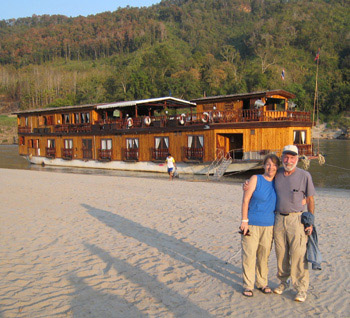
Luang Prabang, a UNESCO World Heritage Site since 1995, is an historic town on a peninsula between the Mekong and Khan rivers, and is small enough to easily walk or bike just about everywhere. On its main street we found restaurants offering every type of food, delightful crafts shops and outdoor markets. As the sun sets, the street is blocked off and transformed into an evening market, where local artisans display their colorful wares.
The town was previously the royal capital of the country and has an abundance of ancient and not-so-ancient wats, or Buddhist temples, including the richly decorated Wat Xieng Thong. Built in 1560, the wat is located in a beautiful garden where the two rivers converge and was the place where the former kings of Laos were crowned. We climbed the 328 steps up Mount Phousi, right in the middle of Luang Prabang, to gold-spired Wat That Chom Sii, where we were treated to a sweeping view of the town, its rivers and the countryside beyond. From there, a short walk took us to the Royal Palace. Built in 1904 for King Sisavang Vong, the site was chosen so that official visitors could disembark from the river to a landing directly below the majestic palace. In 1975, the monarchy was overthrown by the communists and the palace was converted into a museum.
The next day we walked down to the riverbank and boarded the Mekong Sun, a German-Laotian owned riverboat with fourteen cabins, a sundeck, library and lounge. Our cabin was beautifully appointed in mahogany and teak, with a floor-to-ceiling window, a bathroom with separate shower, and lots of amenities, including a welcome package with local souvenirs and postcards of the ship.
The lines were cast off and we began our cruise. As the jungle scenery rolled by, we sat in comfortable lounge chairs on the upper deck, enjoying the sun and sipping daiquiris made with local tropical fruit. Soon we pulled to the shore, and the crew set out the gangplank. We disembarked and hiked up to the Laotian village of Ban Xang Hai, famous for its lau-lau, or rice whiskey. Using water carried from the Mekong, the rice is soaked in large jars, where it ferments. It is then distilled into a strong, flavorful liquor that we came to enjoy quite a lot on this trip! After a visit with the local weavers, we hiked through the woods to the Pak-Ou Caves, two caves filled with thousands of small Buddhas that have been left over hundreds of years by faithful Laotian Buddhists.
Traveling on the Mekong Sun, which was designed for navigating in shallow water and can tie up anywhere, gave us the opportunity to visit remote villages and become acquainted with the local people. We enjoyed many shore excursions, including visits to a working elephant camp, where we watched elephants haul enormous logs from the jungle to waiting cargo boats, and the Kuang Si Waterfalls, which tumble into turquoise pools.
Each evening the ship pulled up to a sand bank, crew members drove stakes into the beach and we tied up for the night. There were always activities on the beach followed by wonderful dinners, where we had our choice of European or Asian cuisine expertly prepared by the chefs on board. There were also lectures in the lounge regarding local culture, history and ecology, as well as cooking and craft classes.
The Mekong is the main artery of life throughout the region, where fishermen troll the river’s waters, river merchants peddle their wares and workmen in small boats commute to and from their daily employment. Cruising through an awe inspiring landscape—hills covered with tropical vegetation and amazing rock formations—and watching life on the river, we came to appreciate this unique corner of the world.
On our last night, we celebrated with a wonderful farewell dinner, then headed to our cabin for the night. Lulled to sleep by the hypnotic rhythms of the river, it is easy to see why the locals call the Mekong the “mother of all waters.”


